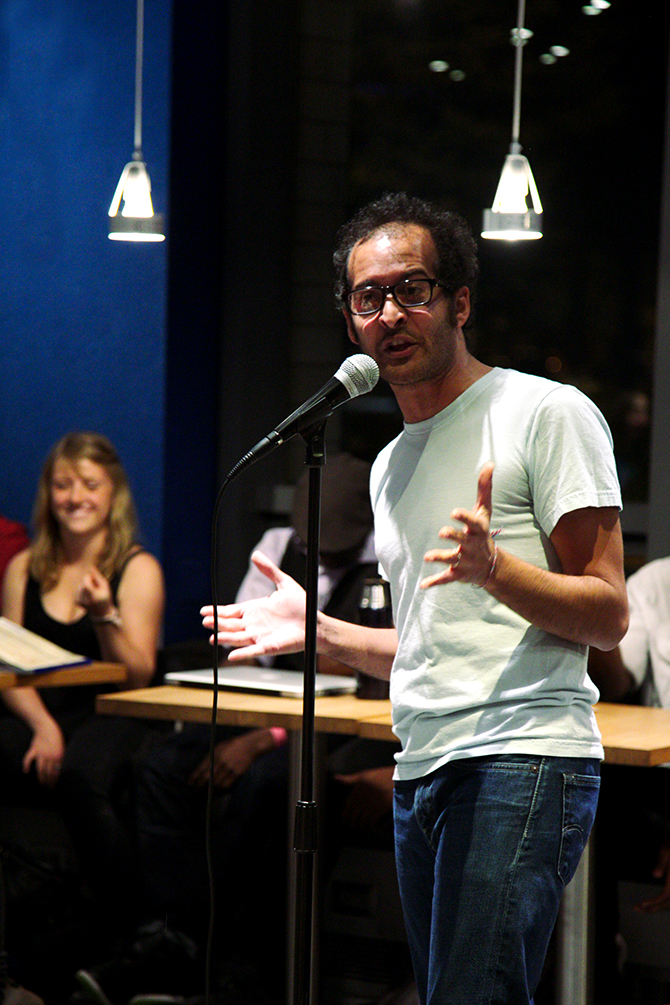
Anis Mojgani is infectious. Here I sit, desperately trying to produce one cool, clinical line to capture the essence of his work and all that comes to mind is a stream of seemingly unrelated, but equally evocative images: a sparrow feeding its kin a trembling but seemingly reconciled worm, a long-abandoned beer can rustling away to the rhythms of the wind, long lost lovers narrowly missing one another at a crowded train station. And watching Mojgani perform is like listening to “Pet Sounds” in the dark or reading Nabokov for the first time—wondrous, crippling, and utterly impossible to shake off.
Bookended by a series of audience-led performances rooted in subjects ranging from the joys of Nintendo to the perseverant beauty of a poverty- and violence-stricken Baltimore, Mojgani’s set served as the first feature of the year for Catcher in the Rhyme, the UofC’s spoken-word poetry gathering. He began with “Come Closer,” a celebration of intimacy delivered in lilting, almost hypnotic tones, urging audience members to give themselves up—to the poet and, more importantly, to themselves. “I want to say that elements of it came from wanting to convey to others that they are of worth. The idea of someone living their whole life without a single person revealing to them how beautiful they actually are,” Mojgani says of the poem on his website. Performative poetry, especially spoken word of this kind, might risk coming off as saccharine, more self-serving than purely intended; but scratchy-voiced, twinkle-eyed Mojgani preempted any such notions with a performance that bled sincerity and an almost saint-like affection for strangers.
“Come Closer” was followed by “Direct Orders (Rock Out),” a snarling call to order, not unlike something a timid audience might hear from Jagger or Bowie: “Rock out like the plane is going down, there are 120 people on board, and 121 parachutes / Rock out like the streets and the books are all on fire and the only way it can be extinguished is by doin’ the electric slide.” Much in keeping with the traditions of his fellow rock stars, Mojgani peeled off his shirt at the end of the performance: “It’s hot in here,” he whispered, smirking at the catcalling and whistle-blowing that ensued.
Mojgani is the kind of guy who’d thrive in conversations punctuated by moments of awkward silence. The moments between his poems were often the funniest and most memorable: a little quip about the “sweet dowry” that he received upon marrying his wife; an anecdote about his gastrointestinal escapades; a profession of his love of biscuits. Every interjection displayed a rare brand of humor that succeeded in making the controversial trivial and hilarious and the banal meaningful, putting it into a perspective that was both universal and intensely personal.
A native of New Orleans, Mojgani is the son of an Iranian father, who immigrated to the United States to study engineering, and an African American mother, who spent her youth vacillating back and forth between New Orleans and Mississippi. While he does attribute a seminal role to these rich cultural backgrounds—both are strongly embedded in the history of the oral tradition—in his development as both a visual artist and a poet of the spoken word, he sees his parents themselves as the more tangible influence on his work. “[They] thankfully recognized the importance of art and thus it was something present in the rearing of us, and any endeavor by us with creativity was heavily supported.” An account of this upbringing was conjured up in an untitled work characterized by dreamy, almost childlike recollections of the past.
Mojgani dedicated his next two poems, “Biscuits and My Wife” and “This Is How She Makes Me Feel,” to his betrothed, a woman he described, rather adorably, as “trifling.” The biscuits poem, a fortunate byproduct of an April Fools’ Day gaffe on the part of Write Bloody Publishing, resurrected a centuries-old debate cataloguing the relative merits of baked goods over one’s beloved. “This Is How She Makes Me Feel” was a love-struck, swoon-inducing paean to the woman who makes him feel “like honey and trombones.” It goes without saying that, afterward, everyone in the room kind of wanted Anis Mojgani.
It was with “Shake the Dust,” his most celebrated piece, that he brought his set to a close. According to the New Testament, groups of Jewish people would shake the dust from their feet upon leaving Gentile cities, to symbolize a separation from the Gentile ways and an acceptance of the Messiah. “Shake the Dust,” written between 1998 and 2000 and inspired largely by Baha’i writings, certainly had Mojgani at his most prophetic. “Make sure that by the time the fisherman returns you are gone, because just like the days, I burn at both ends and every time I write, every time I open my eyes, I am cutting out parts of myself just to give them to you,” he called out, as audience members snapped along. If the post-performance chatter is to be believed, one might easily mistake Mojgani for the leader of a spiritual movement, devoted to spreading his messages about humility, a celebration of the self, and most importantly, a love for and an acceptance of others. Consider me a convert.
